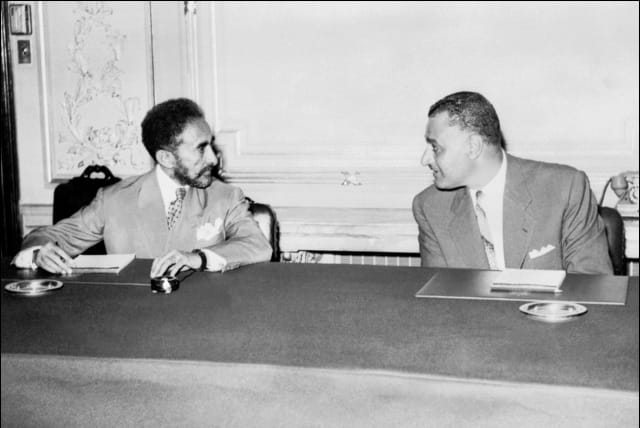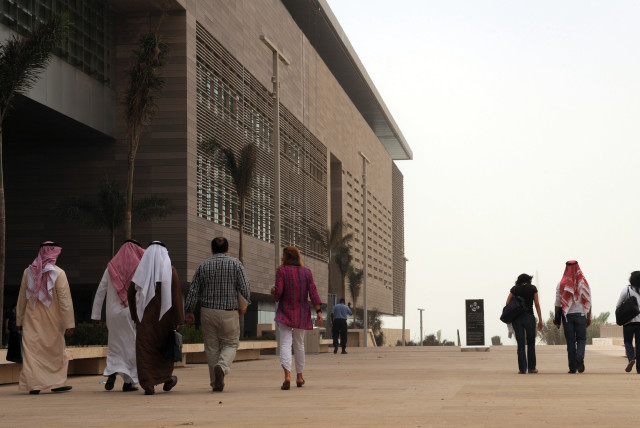Voices from the Arab press: The Nile is a life-or-death issue

A weekly selection of opinions and analyses from the Arab media around the world.
The Nile is a life-or-death issue
Al-Ahram, Egypt, February 10
The relationship between Egypt and Ethiopia has always been marked by stability, particularly during the time of Gamal Abdel Nasser and Emperor Haile Selassie of Abyssinia. The two nations enjoyed wide areas of cooperation in the past. Unfortunately, Ethiopia’s stance has shifted over time, causing aggravation to the Egyptian people, and straining its relationship with its neighboring country, Sudan.
Ethiopia’s ambitions in Somaliland have also grown, leading to an increasing number of disagreements and damaging statements that have harmed relations between Egypt and Ethiopia. Despite the ongoing issue with the Renaissance Dam, which remains an unsolvable crisis due to Ethiopian extremism and their failure to respond to the demands of Egypt and Sudan, Ethiopia remains unyielding in its positions.
It has disregarded internationally agreed-upon water-sharing agreements and closed all avenues for a fair agreement on Nile water with downstream countries. This obstinacy is pushing relations between Egypt, Sudan, and Ethiopia toward escalation. The completion of the dam has made it a tangible reality that cannot be ignored, leaving little room for negotiation.
Although there were opportunities for finding common ground, such as involving Gulf countries that have relations and interests with Ethiopia, the time has passed, and the solution has become increasingly difficult. Negotiation has become nearly impossible and requires immediate attention, as the Nile waters are a matter of life and death.
Egypt once held the upper hand in Nile water issues, and it must not relinquish its historical and legal rights. If legal channels fail to restore these rights, alternative forms of resolution should be explored. – Farouk Gouida
Attracting foreign scholars to Saudi Arabia
Okaz, Saudi Arabia, February 8
The concept of international scholarships and academic exchange programs is often misunderstood. While some may think that they are solely about obtaining an academic degree not available in one’s home country, the reality is much broader. Scholarship programs, such as those taking American and European citizens to countries with fewer educational institutions, go beyond degrees.
These programs foster cultural exchanges, historical understanding, and experiential learning. For instance, many doctors in advanced countries like the United States seek specialized training in Asia and Europe to stay updated on the latest technologies and share knowledge.
In the Kingdom of Saudi Arabia, scholarship programs have a long history and serve developmental goals on various levels. The establishment of the Scholarship Preparation Institute at Taif [University] is a testament to this commitment, as it ensures that students are prepared intellectually, psychologically, and culturally for their scholarship experiences.
Moreover, certain universities in the kingdom have implemented strict regulations requiring their staff to pursue studies abroad. While these laws need modernization, considering the progress of the kingdom, they have resulted in generations of Saudi students studying in various countries worldwide.
This diversity of scholarship destinations positions Saudi Arabia as a global player, benefiting from the expertise and experiences of its citizens who have studied in different parts of the world. As a result, Saudi Arabia can implement the best scientific practices in its homeland.
Taking the medical field as an example, numerous doctors have been sent abroad through scholarship programs for many years. Canada, Britain, the United States, Germany, France, Australia, and other countries have welcomed these Saudi doctors, leading to significant advancements in the kingdom’s health system.
Looking closely at the health systems of these countries, their international recognition is not solely due to the quality of medical outcomes. The availability of pathways for foreign scholarships has played a significant role in transferring knowledge abroad and promoting their cultures, sciences, and civilizations.
Now, it is time for Saudi Arabia to establish its own scholarship program and showcase its capabilities. Saudi Arabia possesses comparable or superior resources to many other countries, and the kingdom needs to enact a comprehensive scholarship system that would welcome foreign professionals across various fields of study.
This should be done in a well-organized and strategic manner, considering universities, training institutions, and private sector companies. With the development and progress witnessed in Saudi Arabia, many students and trainees from different countries dream of studying and training in the kingdom. – Faisal Zaqzouq
Tucker Carlson’s interview with Putin
Asharq Al-Awsat, London, February 9
President Putin’s conversation with American media personality Tucker Carlson has left many journalists envious. It marked the Russian president’s first significant interview since his controversial decision to invade Ukraine. Those who argued against meeting with him and giving him a platform to communicate directly with the American people either did so out of deception or simply failed to grasp the essence of journalism.
Journalists must set aside their personal opinions and emotions and engage even with individuals they disagree with or dislike. Despite popular belief, the role of the media is not to exclusively engage with like-minded people. Instead, journalists prioritize getting the scoop above all else. Even if Hitler were to return to life, genuine journalists would race to interview him, regardless of his past sins and misdeeds.
Carlson’s worldview represents the longstanding debate between isolationists and internationalists; between those who envision a greater role for America in the world and those who advocate for withdrawal and self-focus. Carlson is considered a vocal figure within the isolationist camp.
Conversely, [US President Joe] Biden and his supporters believe in Washington’s responsibility to protect the liberal world order from adversaries like Putin. This discrepancy has led Carlson to attack Ukrainian President [Volodymyr] Zelenskyy, accusing him of embezzling American funds and blackmailing the US in defense of a country that many Americans struggle to locate on a map, let alone understand the historical complexities of. He has also launched a campaign against Biden, blaming him for entangling the US in a futile war.
This ideological clash lies at the heart of this disagreement. This is why Carlson has expressed his support for [Donald] Trump in the upcoming November [US presidential] elections, as Trump claims he can end the war within 24 hours (although such an outcome is highly unlikely, given Trump’s tendency for exaggeration).
In reality, Trump’s language during his first term leaned toward isolationism, but his actions fell short. While he threatened to withdraw from Afghanistan, he ultimately did not follow through, unlike Biden, who eventually carried out the withdrawal. Trump criticized the NATO alliance but remained part of it. He repeatedly expressed a desire to leave Syria, particularly after a call with [Turkish President Recep Tayyip] Erdoğan, only to be opposed by Pentagon generals, forcing him to stay.
Despite his bombastic rhetoric, Trump actually strengthened Washington’s relationships with Middle Eastern allies instead of abandoning them. However, Trump benefits from the populist propaganda propagated by Carlson, aligning with the prevailing sentiment among Americans eager to save money and retract from policing the world.
Historically, America has long exhibited a strong isolationist inclination since its inception. The reason lies in its geographical prosperity, being situated across oceans and shielded from the problems of the Old World – Europe, rife with diverse nationalities, sects, and ideologies. Moreover, America is sandwiched between two relatively weak neighbors, Canada and Mexico.
American leaders traditionally viewed Europe with the same cautiousness they currently do toward the Middle East, wanting to avoid becoming entangled in the latter’s endless quagmires. That explains why the US reluctantly joined both World War I and World War II, becoming involved only after being forced to by events such as the Pearl Harbor attack.
Since then, America has played a pivotal role in shaping the world order in its image, contributing to the establishment of international political and financial institutions, maintaining around 800 military bases globally, and safeguarding vital waterways (as demonstrated by strikes on the Houthis).
However, the likes of Putin and Carlson harbor grievances against this role, each driven by different motivations. They have found common ground in their joint enemy. This is why Putin opted to meet with Carlson specifically. As journalists, we can’t help but admire his audacity. – Mamdouh Al-Muhaini
Dr. Nawaf Salem’s rise to the presidency of the Court of Justice
Nida Al Watan, Lebanon, February 8
When Dr. Nawaf Salam, the former ambassador of Lebanon to the United Nations, was elected as a member of the International Court of Justice, the United States and its allies did not vote in favor of his membership, instead supporting his competitor. The reason behind Washington’s decision was their belief that Salam, during his two-year term as a member of the Security Council, showed sympathies toward the Palestinian cause. Salam, who was previously accused of being sympathetic to America when considered for a leadership role in Lebanon, played a pivotal role in the General Assembly’s vote to recognize the State of Palestine as an observer member of the UN. A tireless effort was required to achieve this milestone, with Salam contributing silently and skillfully.
His efforts led to a majority vote in favor of the resolution, with only nine countries, including the United States and Israel, opposing it. Securing membership required not only political mobilization but also a deep understanding of international law and the UN Charter. Due to this perceived bias, it is likely that Washington also abstained from voting for Salam as a judge in the International Court of Justice in 2018.
While maintaining relationships with other missions, including the United States, Salam prioritizes the sovereignty of the state he represents. His strong convictions in support of the Palestinian cause have necessitated diplomatic confrontations with American policies.
However, Salam earned the respect and appreciation of representatives from various countries during his tenure at the UN in New York. As a member of the Security Council, he even presided over its work for certain months, showcasing his ability to balance his political worldview with a fair and diplomatic approach.
The appointment of Salam as a judge in the Court of Justice, despite opposition from the United States, is a testament to his international credibility. His appointment as president of the court is a significant acknowledgment of his impartiality, combined with his Arab and Lebanese identity.
This appointment comes at a crucial time, as the court addresses the judicial dispute between South Africa and Israel regarding alleged genocide crimes in Gaza. Salam’s presidency holds great implications on this matter, as the court’s decision will be a defining moment in the history of the Palestinian issue. The international community, particularly the younger generation, looks to the court’s actions to shift the perception surrounding Israel and hold it accountable for any crimes it committed.
Salam’s role as president of the court is therefore more impactful than leading the Lebanese government. – Walid Shaqir
Translated by Asaf Zilberfarb.
Jerusalem Post Store
`; document.getElementById("linkPremium").innerHTML = cont; var divWithLink = document.getElementById("premium-link"); if (divWithLink !== null && divWithLink !== 'undefined') { divWithLink.style.border = "solid 1px #cb0f3e"; divWithLink.style.textAlign = "center"; divWithLink.style.marginBottom = "15px"; divWithLink.style.marginTop = "15px"; divWithLink.style.width = "100%"; divWithLink.style.backgroundColor = "#122952"; divWithLink.style.color = "#ffffff"; divWithLink.style.lineHeight = "1.5"; } } (function (v, i) { });

